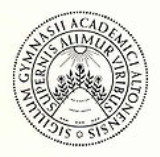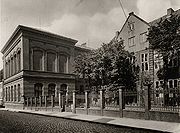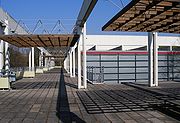
Christianeum Hamburg
Encyclopedia
The Christianeum in Hamburg is a famous former "Latin school" (German
: Lateinschule
) in Hamburg
, northern Germany
. Founded in 1738 by King Christian VI of Denmark
, it is now housed in a building planned by Danish designer Arne Jacobsen
.
 The first Latin school here was founded as early as 1688 (according to other sources: 1683) in Altona (now a part of Hamburg). Decades later the school acquired the status of a famous Gymnasium
The first Latin school here was founded as early as 1688 (according to other sources: 1683) in Altona (now a part of Hamburg). Decades later the school acquired the status of a famous Gymnasium
, the most famous in the duchy of Holstein
, and was re-founded by Christian VI. In 1971 the school was relocated from Hamburg-Altona to its current location in the quarter Othmarschen
.
 Nowadays, classes in Latin and English
Nowadays, classes in Latin and English
are mandatory from fifth grade. In grade nine students can choose between either Ancient Greek
or Russian
. Additionally, courses in Spanish
, French
and Mandarin are offered. The Christianeum has a sizable music department, the school choir being the largest in Germany. Furthermore, the school actively takes part in exchange programs with schools in Chicago
and St. Petersburg. On average, enrollment goes well beyond 100 students per year, exceeding most other schools in Hamburg
in size.
German language
German is a West Germanic language, related to and classified alongside English and Dutch. With an estimated 90 – 98 million native speakers, German is one of the world's major languages and is the most widely-spoken first language in the European Union....
: Lateinschule
Lateinschule
Latin school was the grammar school of 14th to 16th century Europe, though the latter term was much more common in England. Emphasis was placed, as the name indicates, on learning to use Latin. The education given at Latin schools gave great emphasis to the complicated grammar of the Latin...
) in Hamburg
Hamburg
-History:The first historic name for the city was, according to Claudius Ptolemy's reports, Treva.But the city takes its modern name, Hamburg, from the first permanent building on the site, a castle whose construction was ordered by the Emperor Charlemagne in AD 808...
, northern Germany
Germany
Germany , officially the Federal Republic of Germany , is a federal parliamentary republic in Europe. The country consists of 16 states while the capital and largest city is Berlin. Germany covers an area of 357,021 km2 and has a largely temperate seasonal climate...
. Founded in 1738 by King Christian VI of Denmark
Christian VI of Denmark
Christian VI was King of Denmark and Norway from 1730 to 1746.He was the son of King Frederick IV of Denmark and Norway and Louise of Mecklenburg-Güstrow. He married Sophia Magdalen of Brandenburg-Kulmbach and fathered Frederick V.-The reign and personality of Christian VI:To posterity Christian...
, it is now housed in a building planned by Danish designer Arne Jacobsen
Arne Jacobsen
Arne Emil Jacobsen, usually known as Arne Jacobsen, was a Danish architect and designer. He is remembered for contributing so much to architectural Functionalism as well as for the worldwide success he enjoyed with simple but effective chair designs.-Early life and education:Arne Jacobsen was born...
.
History

Gymnasium (school)
A gymnasium is a type of school providing secondary education in some parts of Europe, comparable to English grammar schools or sixth form colleges and U.S. college preparatory high schools. The word γυμνάσιον was used in Ancient Greece, meaning a locality for both physical and intellectual...
, the most famous in the duchy of Holstein
Holstein
Holstein is the region between the rivers Elbe and Eider. It is part of Schleswig-Holstein, the northernmost state of Germany....
, and was re-founded by Christian VI. In 1971 the school was relocated from Hamburg-Altona to its current location in the quarter Othmarschen
Othmarschen
Othmarschen is a quarter in the Altona borough of the Hamburg in northern Germany. In 2006 the population was 12,169.-History:The first records on Othmarschen are from 1317...
.
Present

English language
English is a West Germanic language that arose in the Anglo-Saxon kingdoms of England and spread into what was to become south-east Scotland under the influence of the Anglian medieval kingdom of Northumbria...
are mandatory from fifth grade. In grade nine students can choose between either Ancient Greek
Ancient Greek
Ancient Greek is the stage of the Greek language in the periods spanning the times c. 9th–6th centuries BC, , c. 5th–4th centuries BC , and the c. 3rd century BC – 6th century AD of ancient Greece and the ancient world; being predated in the 2nd millennium BC by Mycenaean Greek...
or Russian
Russian language
Russian is a Slavic language used primarily in Russia, Belarus, Uzbekistan, Kazakhstan, Tajikistan and Kyrgyzstan. It is an unofficial but widely spoken language in Ukraine, Moldova, Latvia, Turkmenistan and Estonia and, to a lesser extent, the other countries that were once constituent republics...
. Additionally, courses in Spanish
Spanish language
Spanish , also known as Castilian , is a Romance language in the Ibero-Romance group that evolved from several languages and dialects in central-northern Iberia around the 9th century and gradually spread with the expansion of the Kingdom of Castile into central and southern Iberia during the...
, French
French language
French is a Romance language spoken as a first language in France, the Romandy region in Switzerland, Wallonia and Brussels in Belgium, Monaco, the regions of Quebec and Acadia in Canada, and by various communities elsewhere. Second-language speakers of French are distributed throughout many parts...
and Mandarin are offered. The Christianeum has a sizable music department, the school choir being the largest in Germany. Furthermore, the school actively takes part in exchange programs with schools in Chicago
Chicago
Chicago is the largest city in the US state of Illinois. With nearly 2.7 million residents, it is the most populous city in the Midwestern United States and the third most populous in the US, after New York City and Los Angeles...
and St. Petersburg. On average, enrollment goes well beyond 100 students per year, exceeding most other schools in Hamburg
Hamburg
-History:The first historic name for the city was, according to Claudius Ptolemy's reports, Treva.But the city takes its modern name, Hamburg, from the first permanent building on the site, a castle whose construction was ordered by the Emperor Charlemagne in AD 808...
in size.
Notable alumni
- Jacob Georg Christian AdlerJacob Georg Christian AdlerJakob Georg Christian Adler was a German Generalsuperintendent for Holstein and Schleswig, Orientalist, Syriac language professor at the University of Copenhagen, Lutheran theologian, Oberkonsistorialrat, book writer, religious educator, coin collector and head of the...
(1756-1834), orientalist - Peter BehrensPeter BehrensPeter Behrens was a German architect and designer. He was important for the modernist movement, as several of the movements leading names worked for him when they were young.-Biography:Behrens attended the Christianeum Hamburg from September 1877 until Easter 1882...
(1868–1940), architect and designer. - Lars ClausenLars ClausenLars Clausen was a German sociologist and professor at the University of Kiel.-Life and work:During World War II, the family lived on the Darß...
(born 1935), sociologist - Alexander DeichselAlexander DeichselAlexander Deichsel is a German sociologist and professor at the University of Hamburg .Deischel completed his abitur at the Christianeum Hamburg....
(born 1935), sociologist - Hans EhrenbergHans EhrenbergHans Philipp Ehrenberg was a German theologian. One of the co-founders of the Confessing Church, he was forced to emigrate to England because of his Jewish ancestry and his opposition to National Socialism....
(1883-1958), theologian - Heinrich Wilhelm von GerstenbergHeinrich Wilhelm von GerstenbergHeinrich Wilhelm von Gerstenberg was a German poet and critic.Gerstenberg was born in Tondern, Schleswig. After attending school in Husum and at the Christianeum Hamburg, and studying law at the University of Jena, he entered the Danish military service and took part in the Russian campaign of 1762...
(1737–1823), poet - Robert KoldeweyRobert KoldeweyRobert Johann Koldewey was a German architect, famous for his discovery of the ancient city of Babylon in modern day Iraq. He was born in Blankenburg am Harz in Germany, the duchy of Brunswick, and died in Berlin at the age of 70...
(1855–1925), architect and archaeologist - Theodor MommsenTheodor MommsenChristian Matthias Theodor Mommsen was a German classical scholar, historian, jurist, journalist, politician, archaeologist, and writer generally regarded as the greatest classicist of the 19th century. His work regarding Roman history is still of fundamental importance for contemporary research...
(1817–1903), classical scholar - Friedrich PaulsenFriedrich PaulsenFriedrich Paulsen was a German philosopher and educator.-Biography:He was born at Langenhorn and educated at Erlangen, Bonn and Berlin, where he became extraordinary professor of philosophy and pedagogy in 1878...
(1846–1908), philosopher - Solomon SteinheimSolomon SteinheimSolomon Ludwig Steinheim was a German physician, poet, and philosopher.-Biography:Solomon was born August 6, 1789, in Altona . He was educated first at the Christianeum, Altona, and pursued his medical studies at the University of Kiel...
(1789–1866), physician, poet and philosopher - Johannes VersmannJohannes VersmannJohannes Georg Andreas Versmann was a German lawyer and politician. He was the first president of the new Bürgerschaft of Hamburg in 1859 and dominated the politics of the hanseatic state as first or second mayor between 1887 and 1899.- Life :Versmann was educated in the classical institutions of...
(1820-1899), lawyer and politician - Hermann WeylHermann WeylHermann Klaus Hugo Weyl was a German mathematician and theoretical physicist. Although much of his working life was spent in Zürich, Switzerland and then Princeton, he is associated with the University of Göttingen tradition of mathematics, represented by David Hilbert and Hermann Minkowski.His...
(1885–1955), mathematician

